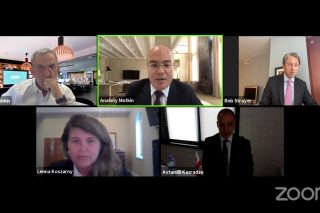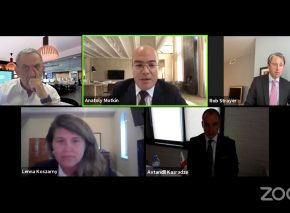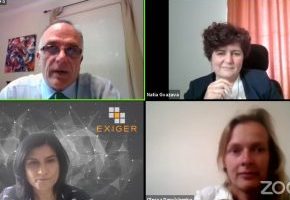
StrategEast hosted online panel on U.S. Investment in Eurasian New Economy
Although the IT industry and other sectors of the “new economy” generate a significant share of GDP and billions dollars of exports from Eurasian countries, the amount of foreign investment in these sectors remains insignificant. How to assist the new economy of the Eurasian countries to discover not only their production capacity but also the investment potential? These issues were discussed in the StrategEast Live session “U.S. Investment in Eurasian New Economy”.
Robert Strayer, Deputy Assistant Secretary for Cyber and International Communications and Information Policy, Bureau of Economic and Business Affairs, US Department of State outlined the basic requirements for the ecosystem, compliance with which can help attract US investment. The main three conditions, according to Mr. Strayer are the following:
– An online infrastructure, including one based on 5G technologies and ready to work with the Internet of things. Infrastructure well protected by cybersecurity system. But it is important that the suppliers of this infrastructure originate from the country with rule of law well-functioning. So that the supply of these services could not be interrupted one day only because, for example, the Chinese government, where the elements of this infrastructure were supplied from, decided to punish a specific company or country for something;
– free flows of data across borders, so that foreign companies can freely sell their products;
– democratic institutions that will help protect the property of a foreign company, including confidentiality of data. And for this, the rule of low should work in the country.
According to Mr. Strayer, the U.S. is always ready to consider the possibilities of cooperation with the countries of Eurasia to create such an environment.
Lenna Koszarny, Founding Partner and Chief Executive Officer, Horizon Capital; Chair of the Board of Directors, American Chamber of Commerce (ACC) in Ukraine spoke about the Ukrainian IT industry, in which the fund led by her makes investments. IT already makes 3% of Ukraine’s GDP and is the third largest industry in the country. At the same time, the IT ecosystem until recently was not supported by the state, it was developing completely with no government intervention, including the training of new specialists – this problem completely fell on the shoulders of the industry itself. Luckily, in the new Ukrainian government, positions in the Ministry of Digital Transformation were taken by people from the IT industry, such as the Minister of Digital Transformation Mykhailo Fedorov and Alexander Bornyakov, the deputy minister for digital transformation, and this inspires optimism.
Arkadiy Dobkin, Founder and CEO, EPAM Systems told that working in different countries of the former Soviet Union, the company meets completely different laws created by states for the development of the IT industry. For example, in Belarus, unlike Ukraine, laws have been developed that maximize investment in the local IT industry. In other countries of Eurasia – Georgia, Armenia, Azerbaijan, the most successful elements of the Belarusian system have recently been copied and this increases the prospect for investments. And for countries that have not done this, the time has come to do it if they are expecting foreign investment.
Avtandil Kasradze, Chairman, Georgia’s Innovation and Technology Agency spoke about the upcoming changes in Georgian legislation that could create conditions for attracting US investment. The economy of Georgia is growing very fast; the country occupies high places in all the major indices related to doing business. The creation of special conditions for the IT industry is planned. In addition to the complete abolition of corporate taxes and VAT, IT companies will apply a reduced income tax on employees’ salaries – 5% instead of 20% accepted in other sectors of Georgia. At the same time, the Georgian government understands that this is not a decisive factor for making a decision on investing. Therefore, professional education programs for IT are also being implemented – in particular, a tender is underway to select a company that will train 500 new IT specialists.
Speaking about working conditions for American companies established in Georgia, Mr. Kasradze recalled that Georgia was the first Eurasian country to officially acquire all licenses for Microsoft products both for state needs and for the entire Georgian education system.
Answering the question by the panel moderator, Anatoly Motkin, President of StrategEast on how the U.S. uses technology as soft power, Mr. Strayer gave examples of how American government institutions, in particular an export-import bank, help foreign telecommunication companies work with 5G networks trusted vendors such as Nokia, Erickson, Cisco. Similar programs, when it was trusted vendors equipment that was purchased with American loans, have already been successfully implemented in India, Singapore and Baltic States.


